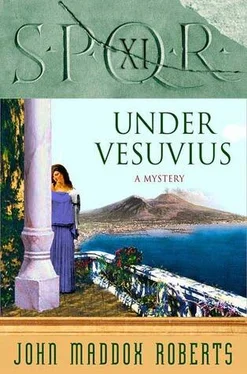John Roberts - Under Vesuvius
Здесь есть возможность читать онлайн «John Roberts - Under Vesuvius» весь текст электронной книги совершенно бесплатно (целиком полную версию без сокращений). В некоторых случаях можно слушать аудио, скачать через торрент в формате fb2 и присутствует краткое содержание. Жанр: Исторический детектив, на английском языке. Описание произведения, (предисловие) а так же отзывы посетителей доступны на портале библиотеки ЛибКат.
- Название:Under Vesuvius
- Автор:
- Жанр:
- Год:неизвестен
- ISBN:нет данных
- Рейтинг книги:3 / 5. Голосов: 1
-
Избранное:Добавить в избранное
- Отзывы:
-
Ваша оценка:
- 60
- 1
- 2
- 3
- 4
- 5
Under Vesuvius: краткое содержание, описание и аннотация
Предлагаем к чтению аннотацию, описание, краткое содержание или предисловие (зависит от того, что написал сам автор книги «Under Vesuvius»). Если вы не нашли необходимую информацию о книге — напишите в комментариях, мы постараемся отыскать её.
Under Vesuvius — читать онлайн бесплатно полную книгу (весь текст) целиком
Ниже представлен текст книги, разбитый по страницам. Система сохранения места последней прочитанной страницы, позволяет с удобством читать онлайн бесплатно книгу «Under Vesuvius», без необходимости каждый раз заново искать на чём Вы остановились. Поставьте закладку, и сможете в любой момент перейти на страницу, на которой закончили чтение.
Интервал:
Закладка:
"If so, I am grateful."
He led me to a small horse tethered behind the ones carrying the bodies. It was a handsome animal but very tired.
"This is the one we've been looking for. Knew it as soon as I saw their tracks." He caught my look. "It wasn't ridden by your murderer. He was a big, ugly brute that was no horseman. That's one reason it was so easy to ride them down. This is a fine beast, but she shouldn't have been carrying so much weight. Whoever rode her to the grove and to the slaver's house was the right weight for her."
"So she was pay," I said. "The murderer gave her as part of the bandits' fee for getting rid of us."
"Makes sense," Regilius said. "Bad bit of luck, though. I was hoping I'd be able to track her to the bugger's stable."
"It would have been conclusive evidence," I affirmed. "But our murderer is very good at getting rid of evidence." How good, I was just beginning to appreciate.
Although I considered the bandit-hunting expedition to have been a disaster, the townspeople felt otherwise. The sight of the dead bandits put them in a good mood and they hailed the cavalry as if they were conquering heroes. It did not hurt that they were Pompeian forces, Campania being one of Pompey's strongholds.
In the early morning, the town forum was packed with people come to witness the trial. Not just the town was there but also people from nearby towns and the surrounding villages. They had all come for the previous day's festival, and were staying on an extra day to see the splashy trial everyone had been talking about for days.
With my lictors clearing the way before me, I took my seat in the cu-rule chair on the dais. At my nod the day's proceedings began with sacrifices and the taking of auguries. To my relief, there was no examining the livers of sacrificial animals, for there was little Etruscan influence so far south. Rome, on the very border of Tuscia, has always been plagued with these liver readers. Instead, the local augurs took the omens decently, by observing the flight and feeding of birds and by determining the direction of lightning and thunder. Whatever methods were used, the omens were deemed propitious and we were permitted to proceed.
A chorus of hisses and execrations greeted Gelon, who rode in escorted by my own men. If his acquittal depended on crowd approval, he was already a dead man. Beside him rode Tiro. The two had spent the previous day closeted together, preparing the defense. Tiro looked confident, but that is part of a lawyer's job.
Next the jury was empaneled, some forty comfortable-looking equites who blandly took frightening oaths before the gods, happy in the knowledge that the gods, too, can be bribed.
One of my lictors led the witnesses to their benches. There were a good number of these, among them Diocles the priest, some nervous-looking temple servants, and Jocasta. Just before all was arranged, a man wearing a white tunic and the winged red hat of Mercury came running into the forum, holding aloft a little golden caduceus. He had tiny silver wings affixed to his sandals, and the crowd made way for him. He halted before the dais and took a small scroll from the wallet slung over his shoulder.
"The Temple of Juno the Protector at Cumae sends this to the Praetor Peregrinus Decius Caecilius Metellus the Younger, holding assizes at Baiae, in accordance with his subpoena." Hermes took the scroll and tipped the messenger as the crowd muttered, wondering what this might mean. Hermes tucked the scroll into his tunic and returned to my side.
I held up a hand for silence and received it. I nodded to young Marcus and he stepped forward, a picture of Roman gravitas. Around his arm was tied a bandage far larger than was justified by the wound beneath. "People of Baiae, attend!" he intoned. "Today the praetor peregrinus hears the case of Gelon, son of Gaeto the Numidian, accused of the murder of Gorgo, daughter of Diocles, priest of the Temple of Campanian Apollo. Long live the Senate and People of Rome!"
"Counselors, attend me," I said. The two advocates approached my curule chair. I nodded to Tiro. He turned to face the crowd and raised his right hand, palm to the sky.
"By Jupiter, Best and Greatest, dispenser of justice and protector of the innocent, I swear that I will prove the innocence of the accused. I am Marcus Tullius Cicero Tiro, freedman of the great proconsul Marcus Tul-lius Cicero."
At my nod the other now turned and raised his hand. He was a tall man with a face of great distinction, about forty-five years of age. His toga was draped in the fashion set by Quintus Hortensius Hortalus, a wonderfully effective look for delivering rhetoric.
"By Jupiter, Best and Greatest, punisher of the guilty, I swear that I will prove the guilt of Gelon, son of the notorious slaver, murderer of Gorgo, daughter of our revered priest. I am Aulus Julius Vibianus, citizen of Rome and Baiae."
This surprised me. I had no idea that the Julian gens had a branch in Baiae. The only Julians you ever heard of in Rome were the ones sur-named Caesar, and there were few of them. They never used the praenomen Aulus. I looked at the man's sandal and it was red, with the ivory crescent at the ankle, so he was a genuine patrician. I glanced toward Julia and she shrugged. She'd never heard of them either, it seemed.
Julia, of course, had no official capacity, and some in Rome might have thought it rather scandalous that she would even be present at one of my trials. But nothing was going to keep her away from this one, just as no law or custom prevented her from occasionally leaning over to whisper something in my ear. As long as she never spoke aloud, no one could accuse her of female interference, or me of being swayed by my wife's advice.
Julia sat behind the dais, accompanied by Antonia and Circe and their whole gaggle of handmaids and pages. At the foot of the dais to my right Tiro and Gelon huddled with Cicero and his brother, getting some last-minute coaching. To my left, Vibianus stood with a group of men, doubtless some of the town's leading legal minds.
We began with the ritualistic denunciations, in which Tiro and Vibianus execrated each other and their respective clients, accusing them of all manner of crime and degeneracy. This is a traditional practice using many stock phrases and is so familiar that I will not bother setting down the vituperative details. Once this was over, the serious part of the trial began. The lots were cast and Tiro got to speak first. Since there were no other cases to be heard that day, I dispensed with the water clock and allowed each advocate to speak as long as he liked, stipulating that the proceedings must be concluded by sundown.
Tiro came forward, his toga draped in the simple, ancestral fashion favored by Cicero. Tiro's posture and assurance of bodily address were so dignified that no one would have guessed that he had ever been a slave had he not freely admitted to that state.
"Citizens of Baiae," he began, "I am here before you to prevent a gross injustice from being done. Gelon, the newly bereaved son of the late
Gaeto of Numidia, has suffered grievously. In the first place, he lost the young woman to whom he was paying court." There were angry mutters from the crowd, but he bore on. "Yes, I know that many of you judged him to be unworthy to approach so highborn a lady, but on what grounds do you judge him? Because his father dealt in slaves? It is a legal business of great antiquity, else how could he practice it openly among you? And this young man has never worked in that trade. Indeed, his dearest wish is to return to Numidia and take up the life of a gentleman of that land." He wisely forebore to mention that this life was, by Roman standards, one of banditry.
"As you all know," he went on, "I have been a slave for most of my life, yet I find no fault in this young man. And, not only did he lose the maiden he loved but also now finds himself unjustly accused of her murder! There is no justification for this calumny! The only reason he finds himself suspect is the spite of Diocles, priest of Apollo. I sympathize with Diocles. Who would be so hardhearted as not to feel the grief of a father for a beautiful and blameless young daughter? But in his grief he has made an unjust accusation. His only cause for believing Gelon is the murderer is that he deemed the boy unworthy to approach his daughter.
Читать дальшеИнтервал:
Закладка:
Похожие книги на «Under Vesuvius»
Представляем Вашему вниманию похожие книги на «Under Vesuvius» списком для выбора. Мы отобрали схожую по названию и смыслу литературу в надежде предоставить читателям больше вариантов отыскать новые, интересные, ещё непрочитанные произведения.
Обсуждение, отзывы о книге «Under Vesuvius» и просто собственные мнения читателей. Оставьте ваши комментарии, напишите, что Вы думаете о произведении, его смысле или главных героях. Укажите что конкретно понравилось, а что нет, и почему Вы так считаете.









